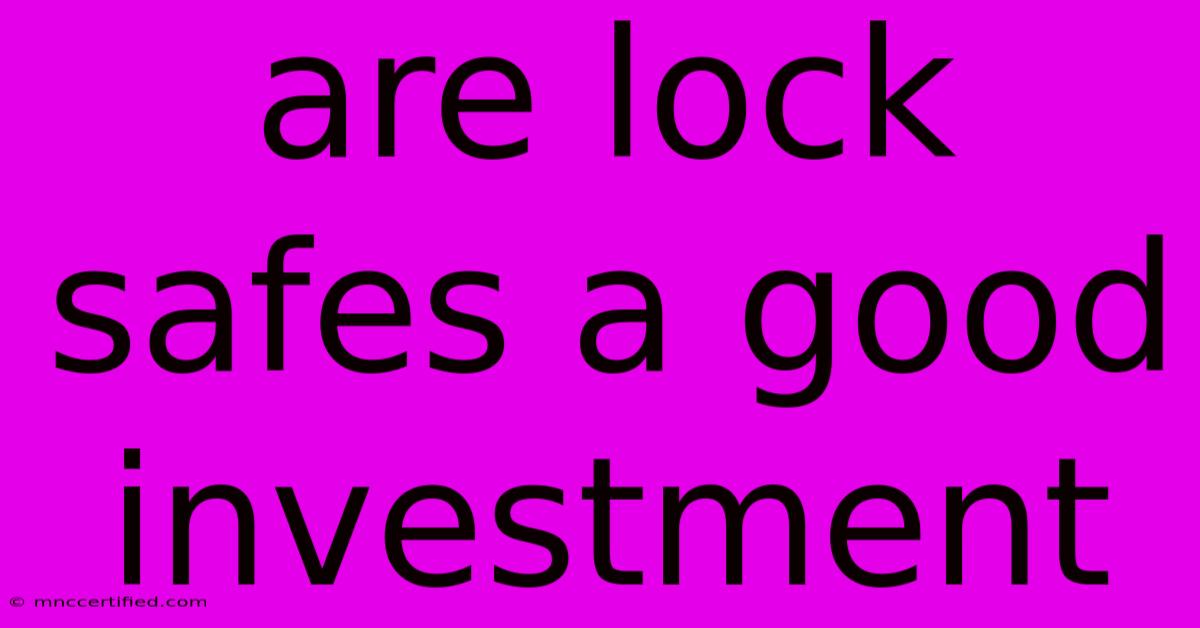Are Lock Safes A Good Investment

Table of Contents
Are Lock Safes a Good Investment? A Comprehensive Guide
Protecting your valuables is paramount, and the question of whether a lock safe is a worthwhile investment often arises. This comprehensive guide explores the pros and cons, helping you determine if a lock safe aligns with your needs and budget. We'll delve into different types, security features, and cost considerations to provide you with a clear picture.
Understanding Your Needs: Why Consider a Lock Safe?
Before diving into the specifics, it's crucial to assess your individual needs. What are you hoping to protect? The answer will significantly impact the type of lock safe you should consider. Are you looking to safeguard:
- Important Documents: Passports, birth certificates, wills, insurance policies, and financial records require robust protection.
- Valuables: Jewelry, expensive electronics, collectibles, and family heirlooms often necessitate secure storage.
- Firearms: Storing firearms safely and legally is a significant concern, demanding specific safe features.
- Cash: While banks are ideal for large sums, a lock safe can protect smaller amounts of cash.
Types of Lock Safes and Their Security Features
The market offers various lock safes catering to different needs and budgets. Understanding the distinctions is key to making an informed decision.
1. Key Lock Safes:
- Pros: Simple, affordable, and readily available.
- Cons: Vulnerable to lock picking and key loss or theft. Limited security compared to other options.
2. Combination Lock Safes:
- Pros: Eliminates the risk of lost keys. Offers a higher level of security than key locks.
- Cons: Requires remembering the combination. Can be susceptible to brute-force attacks if the combination is easily guessable.
3. Electronic Lock Safes:
- Pros: Convenient access using a keypad or biometric scanner. Offers advanced security features like programmable access codes and audit trails.
- Cons: More expensive than key or combination locks. Vulnerable to power outages (if not battery-backed). Potential for malfunction.
4. Fireproof Safes:
- Pros: Protects contents from fire damage. Many models combine fire resistance with burglary protection.
- Cons: More expensive than standard safes. The level of fire protection varies significantly between models. Always check the fire rating (e.g., UL rating).
Factors Affecting the Cost of Lock Safes
The price of a lock safe can vary widely, influenced by several factors:
- Size and Capacity: Larger safes naturally cost more.
- Security Features: Electronic locks, fire resistance, and advanced security mechanisms increase the price.
- Brand and Reputation: Reputable brands often command higher prices due to superior quality and security.
- Materials: High-quality steel and reinforced construction contribute to higher costs.
Is a Lock Safe a Good Investment? The Verdict
The answer depends entirely on your individual circumstances. If you have valuable items requiring protection, a lock safe is almost certainly a worthwhile investment. The cost of replacing irreplaceable items far outweighs the cost of a secure safe. Consider these points:
- Assess Your Risks: How vulnerable is your location to theft or fire?
- Determine Your Needs: What specific items require protection?
- Set a Budget: Choose a safe that meets your needs without breaking the bank.
- Research Different Models: Compare features, security levels, and prices before making a decision.
Beyond the Safe: Remember that a lock safe is only one part of a comprehensive security strategy. Consider other measures like home security systems, strong doors and locks, and neighborhood watch programs.
By carefully considering your needs and conducting thorough research, you can confidently determine if a lock safe is the right investment for you, providing peace of mind knowing your valuables are safe and secure.

Thank you for visiting our website wich cover about Are Lock Safes A Good Investment. We hope the information provided has been useful to you. Feel free to contact us if you have any questions or need further assistance. See you next time and dont miss to bookmark.
Featured Posts
-
Ukraine Attack Russia Uses New Ballistic Missile
Nov 22, 2024
-
Laos Methanol Poisoning Another Tourist Dead
Nov 22, 2024
-
Die Hard Homage In Red One
Nov 22, 2024
-
Business Insurance Staten Island
Nov 22, 2024
-
Adani Faces Us Fraud Charges
Nov 22, 2024